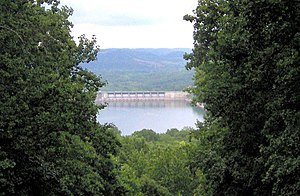Edgar Evins State Park
| Edgar Evins State Park | |
|---|---|

View of Center Hill Dam from visitor center observation tower
|
|
| Type | Tennessee State Park |
| Location | DeKalb County, Tennessee |
| Area | 6,000 acres (24 km2) |
| Operated by | Tennessee Department of Environment and Conservation |
Edgar Evins State Park is a state park in DeKalb County, Tennessee, in the southeastern United States. The park consists of 6,000 acres (24 km2) along the shores of Center Hill Lake, an impoundment of the Caney Fork. The State of Tennessee leases the land from the U.S. Army Corps of Engineers.
James Edgar Evins (1883–1954), the park's namesake, was a Smithville businessman and state senator who played a vital role in the development of the Center Hill Dam and Reservoir in the 1940s. He was the father of former United States Representative Joe L. Evins, for whom the nearby Joe L. Evins Appalachian Center for Craft is named. The Evins family began pushing for the establishment of a state park along the DeKalb portion of Center Hill Lake as early as the 1950s.
The Caney Fork flows down from its source atop the Cumberland Plateau and winds its way northwestward across the Eastern Highland Rim before emptying into the Cumberland River near Carthage, Tennessee. Center Hill Dam, located approximately 26.6 miles (42.8 km) above the mouth of the Caney Fork, has created a reservoir that spans a 68-mile (109 km) stretch of the river between the dam and the Great Falls Dam at Rock Island State Park in adjacent Warren County. Edgar Evins State Park covers the northeast shore of the reservoir immediately upstream from Center Hill Dam.
The park is situated amidst rolling hills ("knobs") that comprise part of the geological boundary between the Eastern Highland Rim and the Central Basin. These hills are typically underlain by Mississippian period limestone, the erosion of which has created karst-like formations throughout the Center Hill Basin. Outcroppings of this limestone are visible along the cliffs overlooking the lake.
...
Wikipedia
